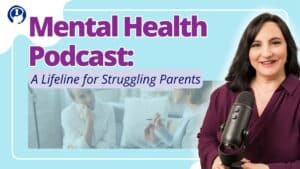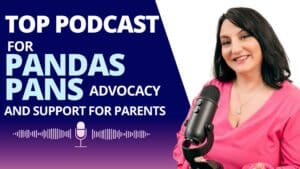Some parents have teens who display mood swings and rule-breaking or risky behaviors. All of these, combined with Attention Deficit Hyperactive Disorder (ADHD) or other clinical issues, can affect their daily life, particularly their academic performance, social relationships, and self-esteem.
For that reason, knowing the signs of ADHD and receiving an accurate diagnosis is crucial. But it's equally important to recognize the impact of ADHD on teenagers. The teenage years are a time of not just hormone-induced mood swings but also social challenges and academic pressures.
The common symptoms of Attention Deficit Disorder include inattention, poor concentration, and inability to focus on tasks like school work and house chores. Their organizational skills may also go awry. They need help managing their time, completing assignments, or keeping track of their responsibilities.
On the other hand, those with hyperactivity and impulsivity presentation will find it hard to sit still and constantly fidget or squirm. These kids speak without thinking, and they engage in risky activities. These can impact their relationship because they wear their peers out. Impulsivity often impacts academic performance in both starting and finishing tasks.
Let me share Mike's story. Mike was diagnosed with ADHD as a young child, making his high school journey more challenging than his peers. Mike often experiences a lack of focus in class. He can't complete assignments on time and stay organized. These struggles affected his academic performance and left him feeling frustrated and misunderstood. His parents tried many interventions and no matter what they did, he just never could keep up with his peers.
The Impact of ADHD on Teenagers
The impact of ADHD on teenagers extends beyond their individual lives. It affects their relationships with family, friends, and teachers. Teenagers with ADHD may struggle to follow family rules causing conflicts and misunderstandings. Their impulsive behavior and difficulty with self-control can strain friendships, while their academic performance may suffer due to poor concentration and organizational skills.
Teens with ADHD often face difficulties with their academic performance taking a hit. They may struggle with staying organized, managing their time, and completing assignments. Socially, they may find it tough to navigate peer relationships, as they often feel misunderstood or excluded. And let's not forget those impulsive decisions and problem behaviors that can get them into trouble.
Furthermore, the emotional well-being of teenagers with ADHD should not be overlooked. They may experience mood disorders, low self-esteem, and frustration due to difficulties. Hormonal changes during adolescence can further exacerbate these challenges.
The Benefits of Behavioral Therapy as a Teen ADHD Treatment
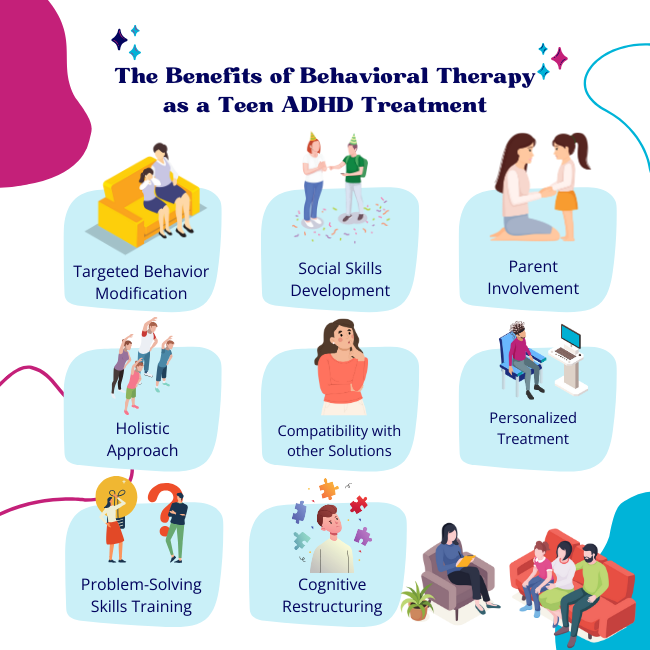
Cognitive behavioral therapy, among many other natural solutions, is a good method to address some of the ADHD symptoms. Here are some of the ways it can help in treating ADHD:
1. Targeted Behavior Modification
Behavior therapy focuses on addressing specific behaviors associated with ADHD in teenagers. It helps them manage impulsivity, increase their attention span, and make better decisions.
Behavior modification techniques aim to reinforce and reduce negative behaviors. It includes strategies such as token economies, where teenagers earn rewards or privileges for demonstrating positive behaviors like completing homework or following instructions.
2. Social Skills Development
Behavioral therapy also provides social skills training to help teenagers improve their communication, problem-solving, and conflict-resolution abilities. It enhances their social interactions and relationships with peers, as well as gain coping skills
Social skills training is vital for teens with ADHD, as they often face challenges in social settings. Therapists help them learn appropriate social behaviors, active listening, conflict resolution, and assertiveness skills. Role-playing exercises and real-life scenarios are often used to practice these skills.
3. Parent Involvement
Family therapy is always a part of a child's behavior therapy, as it involves the parents, siblings, and other family members. Behavioral parent training programs provide families with the knowledge and skills to consistently implement behavior management techniques at home.
The therapy helps improve communication, understanding, and support within the family system. It equips them with the knowledge and skills to create a structured and supportive environment. They learn strategies to establish consistent rules, routines, and positive reinforcement for good behavior.
4. Holistic Approach
Behavioral interventions emphasize the importance of healthy lifestyle changes. It promotes regular exercise, sufficient sleep, and a balanced diet as factors that positively impact ADHD symptoms. For example, as many teenagers with ADHD struggle with managing their time and staying organized, behavior therapy helps them develop practical skills, such as creating schedules, using planners, setting reminders, and breaking tasks into manageable steps.
5. Compatibility with other Solutions
There are many other solutions to ADHD, such as neurofeedback and PEMF, and behavior therapy can be combined with them to offer a comprehensive treatment that addresses the biological and behavioral aspects of the disorder.
6. Personalized Treatment
Behavior therapy is tailored to the unique needs of each teenager, considering their strengths, challenges, and preferences for maximum effectiveness. They’re taught self-monitoring techniques to help them become more aware of their behavior and its impact. They may use tools like daily behavior charts or self-rating scales to track their attention, impulsivity, and task completion. It promotes self-reflection and accountability.
7. Problem-Solving Skills Training
Adolescents with ADHD may struggle with problem-solving and decision-making. Behavior therapy teaches them effective problem-solving techniques and encourages them to define problems, generate solutions, evaluate options, and make informed decisions.
8. Cognitive Restructuring
This process involves identifying and challenging negative or distorted thoughts contributing to difficulties managing ADHD symptoms. Therapists help teenagers reframe their thoughts, replace negative self-talk with positive and realistic thoughts, and develop a more adaptive mindset. Talking with your child and paying attention to what they say can make a huge difference.
ADHD Treatment for Teens: Managing Attention Deficit Hyperactivity Disorder in High School
High school is where social dynamics, academic pressure, and hormone-fueled drama reign supreme. Managing ADHD on this battlefield requires some serious strategy. Teens with ADHD can thrive academically and socially with the right support groups, open teacher communication, and a dash of self-advocacy. Let's equip them with the tools they need to rock those hallways!
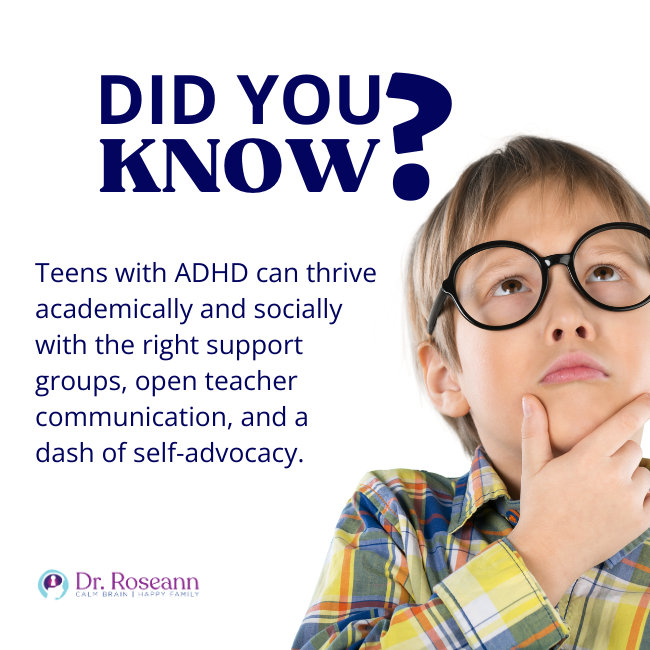
As mentioned, high schools typically offer support services to students with ADHD, such as Individualized Education Plans (IEPs) or 504 plans. These plans outline accommodations and modifications that help students succeed academically, such as extended time for tests, preferential seating, or note-taking assistance. To develop the plan, regular communication between parents, teachers, and the school's support team is essential.
Once the plan has been laid out, developing study skills is key. Teaching effective study skills, such as creating study schedules, breaking tasks into manageable chunks, and utilizing visual aids, can significantly improve academic performance and reduce stress.
High school schedules can be demanding, with multiple classes, assignments, and extracurricular activities. Teaching time and task management skills can help students stay organized and meet deadlines. For this, they can use planners, set priorities, and break down long-term projects.
Other Natural Treatment Options for ADHD Symptoms
In addition to behavioral therapy, several natural solutions can complement the management of ADHD symptoms in teenagers. These science-backed alternative methods address the underlying neurochemical imbalances and promote overall well-being.
If you're a parent concerned with the side effects of ADHD medication on teens and younger children, exploring natural solutions would work for you. Integrating the following natural solutions can provide your teen with the right treatment plan without using stimulant drugs.
1. Neurofeedback
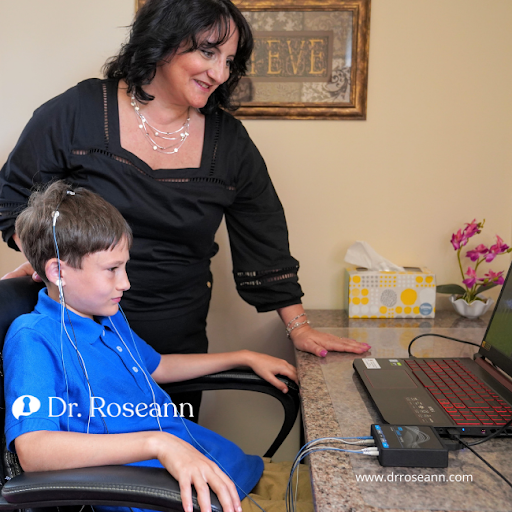
Neurofeedback is a non-invasive technique that trains the brain to self-regulate and function optimally. It involves monitoring brainwave patterns using sensors and providing real-time feedback to the individual.
As the brain learns to modify its brainwave activity, teenagers with ADHD can improve attention, impulse control, and emotional regulation. Neurofeedback has shown promise in reducing ADHD symptoms and improving executive function skills in the long term (Van Doren et al., 2018).
2. PEMF Therapy
Pulsed Electromagnetic Field therapy is a non-invasive technique that uses electromagnetic fields to stimulate brain activity. This therapy can help regulate brain function, enhance neuroplasticity, and improve cognitive performance. Studies suggest that PEMF therapy may alleviate ADHD symptoms through alpha stimulation (Pawluk & Layne, 2017). It also promotes the production of neurotransmitters and enhances neural connectivity.
3. Magnesium Supplements
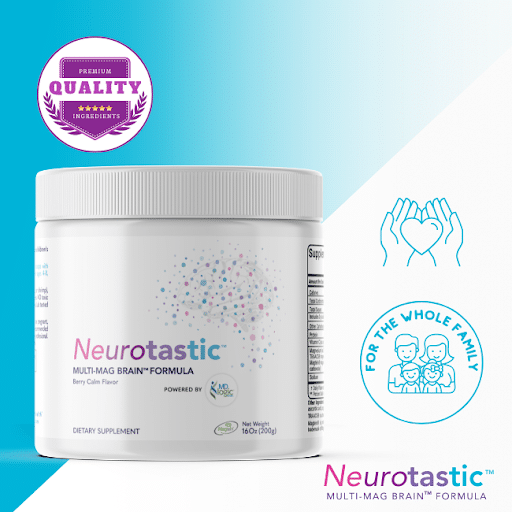
Magnesium is an essential mineral involved in various physiological processes, including neurotransmitter function and regulation of neuronal activity. Research has shown that individuals with ADHD usually suffer from lower levels of magnesium in their bodies (Effatpanah et al., 2019).
Supplementing with magnesium may help reduce hyperactivity, improve focus, and promote relaxation. However, consulting with a mental health professional before starting any supplementation regimen is important.
Returning to Mike's story, aside from behavior therapy, he also used these three natural treatments for ADHD, and his commitment to them paid off. His grades improved, and he developed stronger study skills.
He actively participated in school activities, formed positive relationships, and excelled in his favorite hobbies. The combination of neurofeedback, PEMF therapy, and magnesium supplements unlocked his potential and empowered him to overcome the obstacles that ADHD had presented.
These approaches, including in the BrainBehaviorResetTM Program, aim to address neurochemical imbalances and promote overall well-being. However, consulting with healthcare professionals is essential to ensure a personalized and comprehensive teen ADHD treatment plan that meets their needs. Attention-Deficit Hyperactivity Disorder in teens and young children can be treated without stimulant or non-stimulant medications.
Parent Action Steps
☐ Establish a designated study area and routine for your child.
☐ Practice active listening and open communication with your child.
☐ Ensure your child gets enough restful sleep and eats nutritious meals.
☐ Schedule regular quality time and engage in activities together.
☐ Teach self-control strategies and encourage a growth mindset.
☐ Answer the ADHD Quiz to know if your child has ADHD or something else.
☐ Take our Solutions Matcher to get personalized solutions for your child.
Citations
Effatpanah, M., Rezaei, M., Effatpanah, H., Effatpanah, Z., Varkaneh, H. K., Mousavi, S. M., Fatahi, S., Rinaldi, G., & Hashemi, R. (2019). Magnesium status and attention deficit hyperactivity disorder (ADHD): A meta-analysis. Psychiatry Research, 274, 228–234. https://doi.org/10.1016/j.psychres.2019.02.043
Pawluk, W., & Layne, C. (2017). Power Tools for Health: How Pulsed Magnetic Fields (PEMFs) Help You. FriesenPress.
Van Doren, J., Arns, M., Heinrich, H., Vollebregt, M. A., Strehl, U., & K. Loo, S. (2018). Sustained effects of neurofeedback in ADHD: a systematic review and meta-analysis. European Child & Adolescent Psychiatry, 28(3), 293–305. https://doi.org/10.1007/s00787-018-1121-4
Always remember… “Calm Brain, Happy Family™”
Disclaimer: This article is not intended to give health advice and it is recommended to consult with a physician before beginning any new wellness regime. *The effectiveness of diagnosis and treatment vary by patient and condition. Dr. Roseann Capanna-Hodge, LLC does not guarantee certain results.
Are you looking for SOLUTIONS for your struggling child or teen?
Dr. Roseann and her team are all about science-backed solutions, so you are in the right place!
Is it ADHD or something else?
Take the quiz to find out why your kid can’t focus, listen, or complete tasks.
Empower yourself with natural solutions for your child's mental health and behavior. Download our FREE quick start guide and start supporting your child today.
You can get her books for parents and professionals, including: It’s Gonna Be OK™: Proven Ways to Improve Your Child’s Mental Health, Teletherapy Toolkit™ and Brain Under Attack: A Resource For Parents and Caregivers of Children With PANS, PANDAS, and Autoimmune Encephalopathy.
If you are a business or organization that needs proactive guidance to support employee mental health or an organization looking for a brand representative, check out Dr. Roseann’s professional speaking page to see how we can work together.
Dr. Roseann is a Children’s Mental Health Expert and Therapist who has been featured in/on hundreds of media outlets including, CBS, NBC, FOX News, PIX11 NYC, The New York Times, The Washington Post, Business Insider, USA Today, CNET, Martha Stewart, and PARENTS. FORBES called her, “A thought leader in children’s mental health.”

She is the founder and director of The Global Institute of Children’s Mental Health and Dr. Roseann Capanna-Hodge, LLC. Dr. Roseann is a Board Certified Neurofeedback (BCN) Practitioner, a Board Member of the Northeast Region Biofeedback Society (NRBS), Certified Integrative Mental Health Professional (CIMHP) and an Amen Clinic Certified Brain Health Coach. She is also a member of The International Lyme Disease and Associated Disease Society (ILADS), The American Psychological Association (APA), Anxiety and Depression Association of America (ADAA) National Association of School Psychologists (NASP), International OCD Foundation (IOCDF) International Society for Neurofeedback and Research (ISNR) and The Association of Applied Psychophysiology and Biofeedback (AAPB).
© Roseann-Capanna-Hodge, LLC 2023



